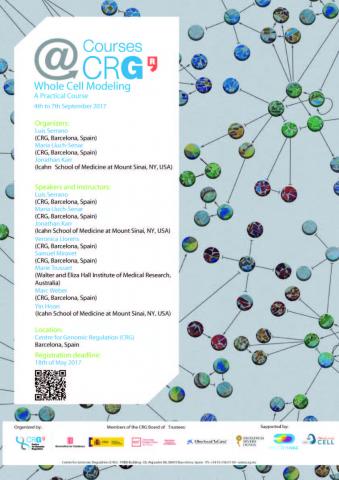Course description
Whole-cell models are promising tools for predicting phenotype from genotype by accounting for every individual gene and cell function. Whole-cell modeling has the potential to enable rational bioengineering and precision medicine. However, significant work remains to develop fully complete and accurate whole-cell models. The goal of the 2017 Whole-Cell Modeling Summer School is to provide young investigators cutting-edge training in large-scale dynamical modeling and model integration. Please download the poster here.
Why participate?
The course will be the first course focused on multi-algorithm whole-cell modeling. It will teach strategies for building and managing large models which aren't covered by any other course including multi-algorithm modeling, model organism database curation, surrogate modeling, and software development. The course will feature didactic lectures, interactive hands-on tutorials, and student research talks. The mornings will feature lectures on modeling individual pathways. The afternoons will feature interactive hands-on tutorials on building and analyzing multi-algorithm models to generate and evaluate hypotheses. Throughout the course, students will work toward building a small whole-cell model. In addition, the course will include student talks to enable them to share their own research.
Organizers
- Luis Serrano (Center for Genomic Regulation, Barcelona, Spain)
- Maria Lluch-Senar (Center for Genomic Regulation, Barcelona, Spain)
- Jonathan Karr (Icahn School of Medicine at Mount Sinai, NY, USA)
Speakers and Instructors
- Luis Serrano (CRG, Barcelona)
- Maria Lluch-Senar (CRG, Barcelona)
- Jonathan Karr (Icahn School of Medicine at Mount Sinai)
- Veronica Llorens (CRG, Barcelona)
- Samuel Miravet (CRG, Barcelona)
- Marie Trussart (Walter and Eliza Hall Institute of Medical Research)
- Marc Weber (CRG, Barcelona)
- Yin Hoon Chew (Icahn School of Medicine at Mount Sinai)
Who is the course for
The course is designed for PhD students and postdoctoral scholars who wish to gain training in large-scale dynamical modeling. Students should already have a strong foundation in computational systems biology including dynamical modeling and scientific programming.
Pre-requisites:
The course will focus on teaching students theory and techniques for large-scale dynamical modeling. Participation in the course requires prior knowledge of dynamical modeling and computer programming including:
- Flux balance analysis
- Ordinary differential equations
- Stochastic modeling
- Object-oriented programming in MATLAB or Python
Duration of the course
The course will start on Monday September 4th at 3pm and finish on Thursday September 7th at 5pm.
Number of participants: 20
Registration fee: 400 Euros for academic researchers, 800 Euros for industry (includes participation in workshop, all the necessary tools to follow the course, didactic material, coffee breaks, lunches, networking event).
Registration
Only online registration is accepted
Registration Deadline: 18th May 2017
Worldwide participants will be selected according to their submitted CV, motivation letter and short abstract about their work.
Participants will be notified if they have been selected for the course by the end of May 2017.
2 Registration Fee Waivers will be offered to facilitate the participation of students coming from labs located in countries in need of scientific strengthening.
Venue
CRG – Centre for Genomic Regulation
Dr. Aiguader 88
08003 Barcelona, Spain
How to get to the CRG ?
Contact
Training
Dr. Aiguader 88
08003 Barcelona
Email: training@crg.eu

